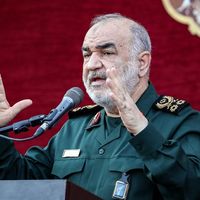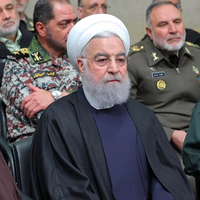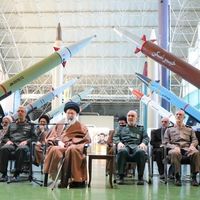Iranian-Swedish scholar denies cooperating with Tehran
Roozbeh Parsi, director of the Swedish Institute for International Affairs’ Middle East program, has denied any cooperation with the Iranian government following a media investigation linking him to a Tehran-directed influence network.
His response followed a report by Sweden’s TV4 and an article by Expressen, one of Sweden's most prominent dailies, which accused him of involvement in a network linked to Iran’s ministry of foreign affairs.
On Tuesday, TV4 reported that Parsi, the brother of former NIAC president Trita Parsi, had been connected to an Iranian initiative aimed at shaping Western policies.
The investigation, which cited emails provided by Iran International, followed a 2023 joint exposé by Iran International and Semafor that detailed Tehran’s efforts to cultivate relationships with academics and analysts abroad to expand its influence.
Sophie Löwenmark, a columnist for Expressen, wrote on Friday that “Parsi has participated in an advocacy network for a brutal dictatorship that today is a threat to Sweden, Swedish-Iranians, and Jews.”
She argued that his engagement had been secretive, without disclosure to his employers, and concluded that “this is not how someone you have full confidence in acts, but rather someone who appears to be the mouthpiece of the mullahs in Sweden.”
Parsi rejected her remarks in a response published by Expressen, saying that he had no financial ties to the Islamic Republic. He emphasized that his role as an academic allowed him to engage with different parties without political consequences.
“Unlike states, I do not represent any party and can therefore speak to everyone,” he wrote.
He also said that he participated in the Iran-led initiative on behalf of the British Foreign Office, not the Swedish Institute for International Affairs, arguing that TV4 and Löwenmark had omitted that detail.
“Certainly, Iran's aim with the initiative was to influence the West, but the participants' motives were something else entirely,” Parsi noted, adding that Western governments used such interactions to strengthen their positions in nuclear negotiations with Iran.
He dismissed criticisms from some Swedish-Iranians over his alleged ties to the Islamic Republic, saying, “My ‘crime’ is that I refuse to follow their lead and don't paint everything related to the Middle East and Iran in bright colors consistent with their ideologies.”
Löwenmark responded in Expressen, challenging Parsi’s arguments. She argued that he acknowledged Iran’s intent to influence Western perspectives but failed to address leaked data showing that participants actively collaborated with Tehran’s interests through ghostwriting and other methods. She also noted his lack of transparency about how he joined the network or why he kept his participation hidden from colleagues.
“More importantly, he doesn’t seem to mind being part of a confidential circle convened by one of the world’s most brutal and repressive states,” she wrote. “It is inexplicable that he does not seem to realize the significance of the fact that the agenda of this secret network was not human rights, taxes, or welfare—but nuclear programs.”
Swedish MP says Parsi promoting Iran's interests
Swedish lawmaker Nima Gholam Ali Pour on Saturday accused Parsi of "promoting the interests of the Iranian regime", vowing to follow up his dismissal from taxpayer-funded the Swedish Institute for International Affairs at the Parliament as his employment is "completely unacceptable."
"If individuals like Rouzbeh Parsi—who sympathize with Sweden’s enemies—are to work at the Institute, why should the Swedish people fund such an organization? The Institute might as well reach out to the mullahs and ask for money," the Swedish MP of Iranian origin said in a post on his X account.







